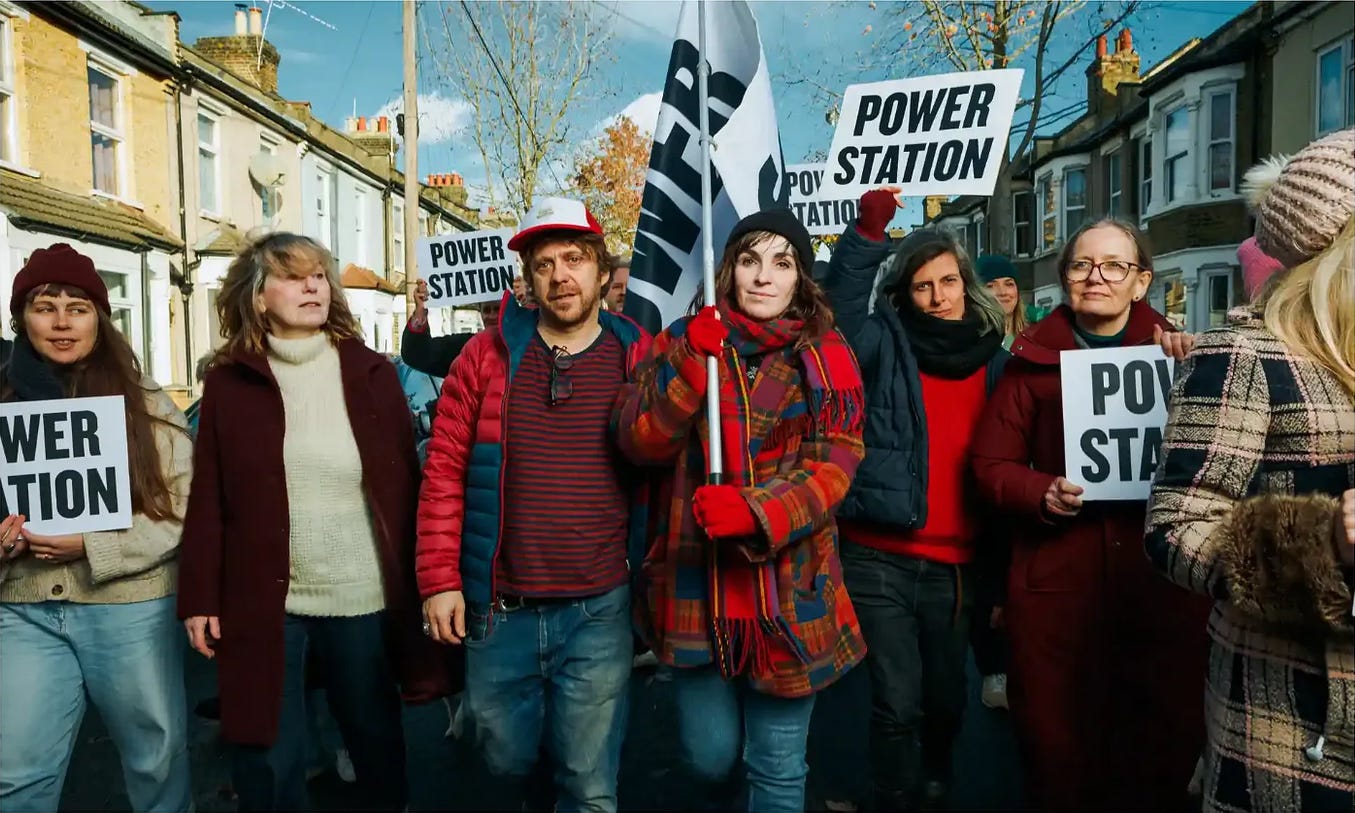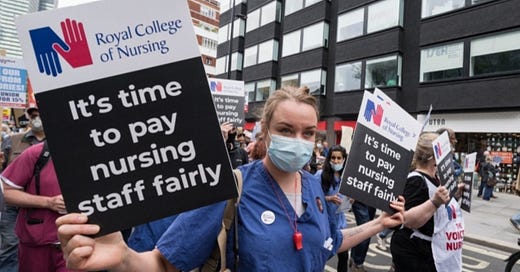Will Spending on Nurses Disrupt Markets?
Plus how some Londoners are building their own power stations, and my book of the season, The Currency of Politics.
First, warmest wishes to all my loyal subscribers for good health, peace and an economic transformation in the year ahead, 2023. Thank you for subscribing. The support of every one of you is noted, and much appreciated.
Its been a hectic seasonal break. The house had to be freshened up and Christmas decorations hauled down from the attic. All in time for a new grandchild and her parents, on their first visit from Vietnam since the pandemic lockdown.
A joyful time was had by all, with rest and recuperation firing up energy levels. Indeed there is nothing more replenishing than building sandcastles on a wet, sandy beach with a visibly excited and energetic four-year old - and then recuperating back home with hot soup, mince pies and Christmas telly.
Yet even while a four year-old grandchild was endlessly diverting, not even she could distract my attention from the planet’s ongoing economic and ecological crises. Here in the UK workers are striking, and worldwide asset markets are tanking. So future System Change posts are in the pipeline: British house prices and the Irish property boom raised its ugly head over the Christmas season. Pensions and whether we can trust pension managers to protect our future needs was also a worry. Not to mention the weird variations in temperatures in our neck of the woods, and floods and ‘cyclone bombs’ elsewhere.
While we make conscious efforts to cut back on energy use, thanks to sky-high prices and profiteering by energy companies - South Africans are denied that choice. Their attempts to tackle poverty and social injustice are made harder by ‘load shedding’ - long periods when the lights go out. That happens thanks to corruption at their major energy supplier - ESKOM. So they’ve no choice but to spend many working hours in the dark. David Pilling’s article in the FT on this sad subject made compelling reading.
“Every building a power station”
However there is some good news from other parts of the global forest: first, from my good friends, Daniel Edelstyn and Hilary Powell, pictured below, who with their Lynmouth Road neighbours are raising funds to ensure every home in their street becomes a power station.

As Anna Fielding of the Guardian explained:
The couple are artists and filmmakers. They live in the middle of the street, with their children, Esmé, 12, and George, 10, and the family’s two dogs. “It is a street that has a sense of community,” says Hilary, down from the roof and sitting at their kitchen table. “That became apparent with the Covid mutual aid group that was set up.” And it was during lockdown that a sentence from economist Ann Pettifor’s book, The Case for the Green New Deal, which makes a strong argument for total decarbonisation and a financial system based on fairness, struck both of them. The phrase was: “Every building a power station.” “We clung on to that,” says Hilary.
Then there is the election of President Lula in Brazil, and the appointment of a ‘Green Champion” Marina Silva, to protect the Amazon forest. The other good news to reach us is that the European Union is proposing to overhaul the energy market - to prioritise cheaper renewable power - and push back on expensive gas and nuclear power markets.
According to Alice Hancock and Richard Milne in the Financial Times,
In a draft document outlining possible reforms, seen by the Financial Times, the commission suggests making renewable power more reflective of its “true production costs”, given that once the infrastructure is built, the energy source for a wind farm or solar array is essentially free.
If the British government were to follow suit - and there is no guarantee they will - that would be good news for Scotland’s many wind-farms. Including the one I visited in October - Lewis island in the Outer Hebrides - as part of the Scottish government’s Just Transition Commission.
The Currency of Politics
Once things had calmed down at home, and our visitors had departed (sigh... ) I found time to read Stephan Eich on The Currency of Politics - the Political Theory of Money from Aristotle to Keynes: a book on the politicisation and then deliberate ‘de-politicisation’ of money. It is a gripping read for monetary nerds but its thesis - that money is political - must reach a much wider audience.
Readers will have heard central bankers boast of their “independence” - presumed to be from politics, but also from markets…But you will also know from System Change posts that central bankers are far from independent and are not a-political.
Stephan Eich argues that
Much of what passes as ‘depoliticisation’ would be more accurately described as de-democratisation of monetary politics, which itself ought to be subjected to democratic scrutiny.
Unlike many economists, Eich - a political theorist - understands that money is not, nor ever has been a commodity like bitcoin, or silver or cigarettes. He writes:
Physical tokens are often used to record or discharge debt; but to mistake the token for money is, as Keynes once quipped, “like confusing a theatre ticket with the performance.” Rather than being a commodity of convenience, money is a technology of credit. As a social relation it exists prior to the market.
Music to my ears. More on this book in a later post.
Will capital markets challenge spending on nurses?
I want to address some unfinished points I made in the December post, “To Pay for Nurses' Wage Rises, Raise Incomes”
I know many readers worry that powerful private markets in money and government bonds will react badly and hike up rates for public (and private) borrowing - if government spending on for example nurses wages, were to rise.
Many were rightly spooked by the market reaction to the reckless Truss/Kwarteng ‘mini-budget’. Many millions were hurt by the hike in market interest rates that were a consequence of the Kwarteng budget.
My first response is this: if spent wisely - on direct or indirect investment that creates jobs - then government spending generates income (tax revenues). Those returns on public investment will I believe, satisfy and reassure private investors in government bonds.
Why? Because increased tax revenues from more jobs and higher incomes will help ‘balance the government’s books’. That means safe returns for, amongst others, pension fund investors in British government bonds.
If spent unwisely - on tax breaks for the rich and on high real interest rates - private markets will react badly. For the simple reason that tax breaks for the rich and interest payments drain the Treasury’s coffers, and do not provide a commitment to replenish coffers in the future.
Investment on increasing for example a nurse’s or railway woman’s pay by contrast, increases current tax revenues, and helps guarantee future tax revenues for the Treasury.
The Truss/Kwarteng team set out a plan to use borrowed funds to a) cut taxes for most taxpayers, b) hand tax cuts to the already-rich, c) signal bigger tax cuts in the future and d) offer big subsidies to private energy corporations.
Investors in capital markets were right to react negatively - because the government had engaged in deliberate self-harm - by using borrowing to cut its own income needed to repay that borrowing.
They did this first, by promising to cut existing taxes and future tax revenues.
Second by promising cuts to taxes for the rich.
Because the rich tend to save and not spend their overflowing purses, these cuts would simply be a drain on the economy.
Third, by promising tax cuts in the future.
And fourth, by giving grants to big corporations already profiting (some say profiteering) from the energy crisis. BP and Shell are unlikely to invest those grants, but will instead transfer them to their already-rich shareholders.
Shareholders (the wealthy) would be unlikely to spend and invest government largesse on projects that would create jobs and generate future income.
So market reaction to the Truss government was entirely rational. Her government stupidly wanted to go even further in damaging the public finances than George Osborne’s programme of sustained economic self-harm - decades of austerity and rising public debt.
The Truss/Kwarteng failure to invest in job creation, and in higher incomes, and the crisis that followed, explains why employment - full, skilled, well-paid employment - is so fundamental to the government’s finances - but also to the stability of the monetary system.
Employment and higher wages enable the government and private sector to raise the income needed to invest in new projects; but also to balance both private sector, and public sector budgets - and thereby stabilise the public finances.
If we are to flourish - and if we are to mobilise the finance needed to spend on transforming our economy away from dependence on fossil fuels - then it is vital that the monetary system remains relatively stable, that rates of interest are low and sustainable, and that investment in transformation creates jobs that generate income - now and into the future.
Full, decent, well-paid employment - because of its role in generating tax revenues and balancing budgets - is fundamental to monetary stability, but also to our ability to finance the coming transformation.
Like bread and butter or rice and beans - full, skilled, well-paid employment and monetary stability go hand in hand.
As Keynes argued: “Look after employment, and the Budget will look after itself.”
So yes, Prime Minister Sunak - the government would be wise to borrow to invest in increasing the wages of nurses - and other public sector workers.
This may come as a reverse of the orthodoxy - but such economic wisdom would generate both financial, economic and political benefits.







The ultimate democratization of money will be the strategic integration of the new paradigm of Monetary Gifting into the Debt Only based system via the three policies of:
1) a 50% Discount/Rebate policy at retail sale
2) a (approximately) $1000/mo. universal dividend for everyone 18 and older for life
3) a 25-50% Discount/Debt Jubilee at the point of loan signing
There of course is an entire regulatory and taxation program that logically and integratively attends these three primary policies.
Instead of always separately "horsing around" with palliative reforms all monetary and economic theorists need to look at the integrative beneficial effects of a true operant applied concept/entire pattern/paradigm change in money and economics.
“One can resist the invasion of armies; one cannot resist the invasion of ideas.” Victor Hugo
Hi Ann and thank you for this smorgasbord today, especially the concluding wisdom.
Humane.Energy is working on a plan to spread something like the power station plan collaboratively across the UK, with the potential for a huge and positive impact on cities and communities across the four nations.
A new Westminster Forum, modelled on the previous successful one which nurtured the creation of the FCA innovation unit starting almost 10 years ago, but this time focussed on the future of energy (as well as current hardship and harm through energy poverty), will kick off this month in support.
Would like to invite your participation in this session or otherwise one later in the year?
Also share our plans and vision for decentralising energy production as well as some of the urgent work on abuse of smartmeters which using a previously unknown feature to evade regulations and is dipping into the pockets of the poorest.
Thanks again and looking forward to speaking
Barry